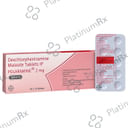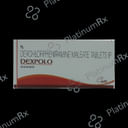Dexchlorpheniramine
Uses
Dexchlorpheniramine is used to treat allergic conditions, vertigo, stimulate appetite, and manage morning and motion sickness.
How it Works
How Dexchlorpheniramine works Dexchlorpheniramine is an antihistamine medication. It blocks the action of specific chemical messengers that are responsible for inflammation, congestion, itching, and other allergic reactions.
Side Effects
Common side effects of Dexchlorpheniramine include rash, headache, dizziness, blurred vision, nausea, dry nose, constipation, dryness of the mouth, chills, urticaria, photosensitivity, increased sweating, dry throat, palpitations, high blood pressure, vomiting, decreased appetite, diarrhea, restlessness, anxiety, tremors, excitement, and epigastric pain.
Expert Advice
- Avoid driving or operating hazardous machinery, as it may decrease alertness.
- Avoid consuming alcohol while taking Dexchlorpheniramine, as it may cause excessive sleepiness or drowsiness.
- Dexchlorpheniramine is not recommended for use in children under 12 years of age.
- Patients with underlying medical conditions should consult their doctor before taking Dexchlorpheniramine.
- Dexchlorpheniramine should not be taken by patients currently using Monoamine oxidase inhibitors, such as isocarboxazid, phenelzine, or tranylcypromine.
- Pregnant and breastfeeding mothers should not take this medication unless prescribed by a doctor.
Related Medications
Dexchlorpheniramine 2mg

₹18.2

₹25.2
MRP ₹30.8
Dexchlorpheniramine 2mg

₹30

₹25.2
MRP ₹30.8
Dexchlorpheniramine 2mg

₹13.5

₹25.2
MRP ₹30.8
Dexchlorpheniramine 2mg

₹20

₹25.2
MRP ₹30.8
Dexchlorpheniramine 2mg

₹15

₹25.2
MRP ₹30.8
Dexchlorpheniramine 2mg

₹15

₹25.2
MRP ₹30.8
Dexchlorpheniramine 2mg

₹28

₹25.2
MRP ₹30.8
Dexchlorpheniramine 2mg

₹30

₹25.2
MRP ₹30.8
Dexchlorpheniramine 2mg

₹12

₹25.2
MRP ₹30.8
Dexchlorpheniramine 2mg

₹14

₹25.2
MRP ₹30.8
Dexchlorpheniramine

₹16
Dexchlorpheniramine 6mg

₹37.5
Dexchlorpheniramine 0.5mg
₹20.4
Dexchlorpheniramine 6mg

₹32.7
Dexchlorpheniramine 6mg

₹32.9
Dexchlorpheniramine 6mg

₹35
Dexchlorpheniramine 6mg

₹15.4
Dexchlorpheniramine 6mg

₹29.5
Dexchlorpheniramine 6mg

₹24.9
Dexchlorpheniramine 6mg

₹31.1
Dexchlorpheniramine 6mg

₹10
Dexchlorpheniramine 6mg

₹40.2
Dexchlorpheniramine 6mg

₹22
Dexchlorpheniramine 4mg

₹13
Dexchlorpheniramine 6mg

₹32
Flat ₹100 off on first app order | Use Code: APP100 |
Flat ₹100 off on first app order
USE CODE: APP100

Download Now